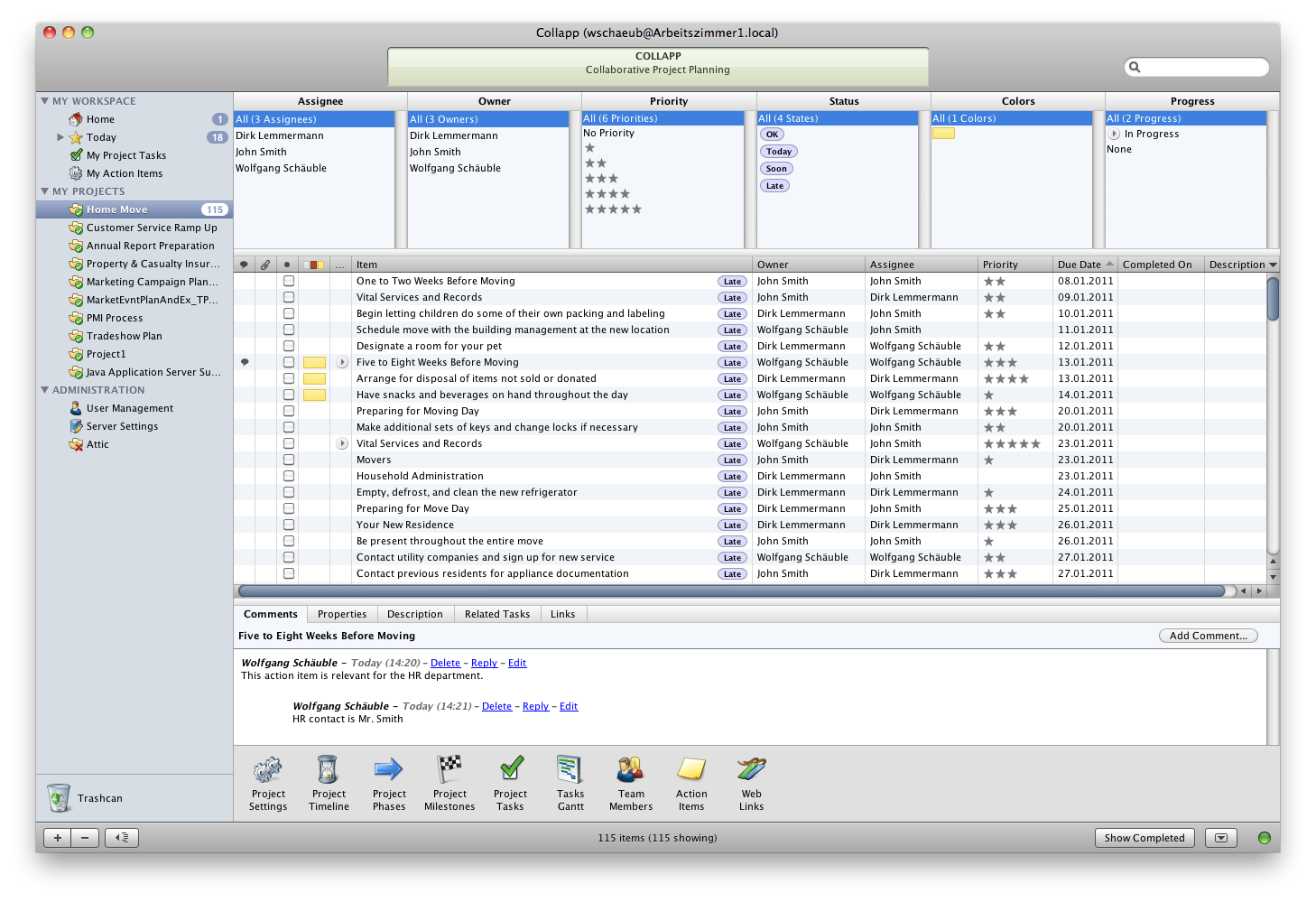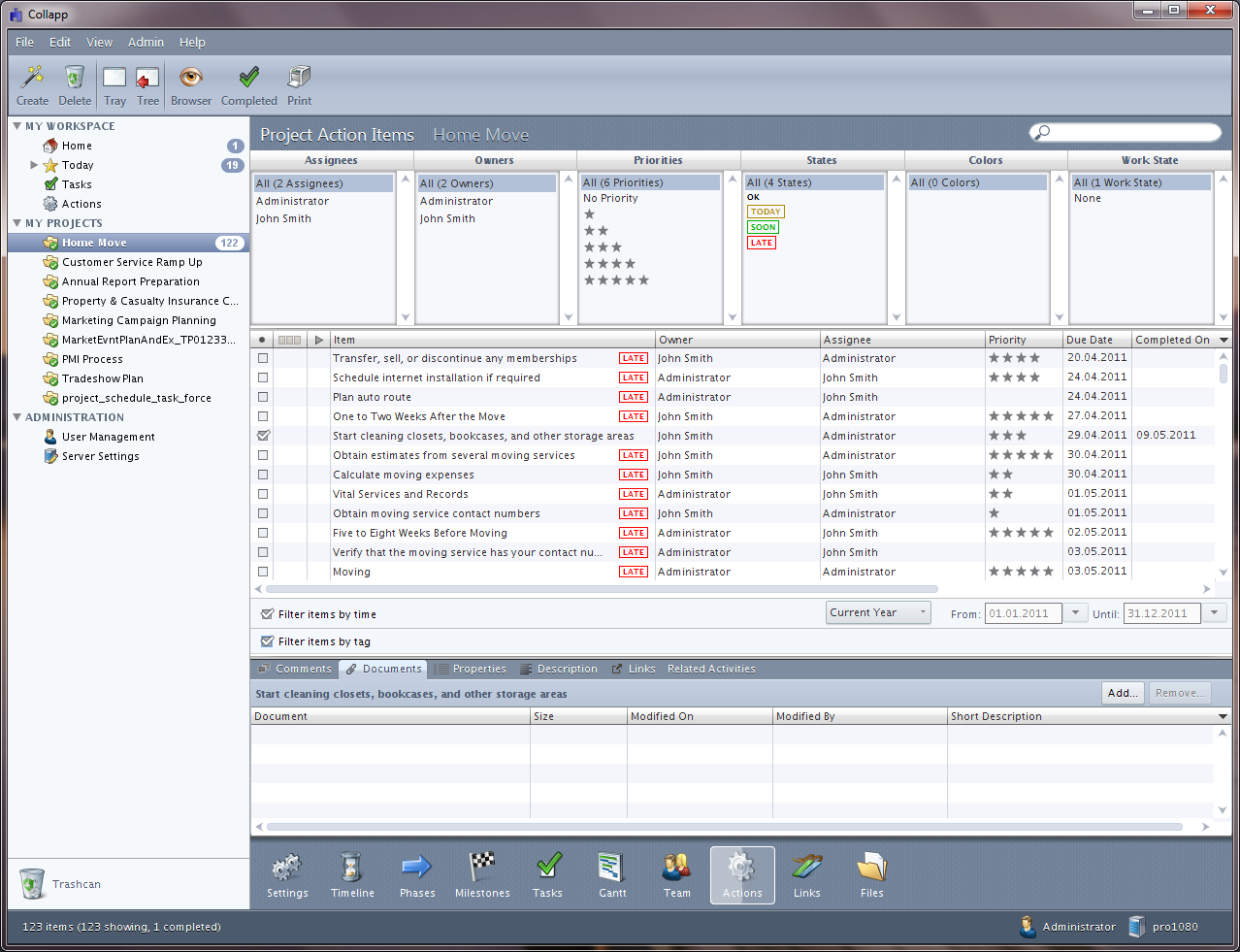I recently started using the look and feel library BizLaf of Centigrade GmbH (Germany) and I have come to the conclusion that, after 13 years of programming Swing UIs, this is by far the best look and feel library for Java that I have ever used. Reason enough to blog about it and to share my thoughts.
Prologue
For the last 2 and a half years I have been working on my very own software project called “Collapp” for collaborative project planning. I have made it my mission to make it one of the most professional looking applications ever written for Java (this is probably the reason why I still haven’t been able to release it). To me this means that the application should look polished on all platforms and at the same time feel natively to the platform it runs on. On a MacIntosh it should look like a Mac application (e.g. iTunes, iWeb, iPhoto, …) with typical Mac features (unified toolbar, sourcelist, …). On Windows it should look like a Windows application with the frame containing the menubar, and so on. It should be noted that Windows generally allows a higher degree of freedom when it comes to UI design (this can be good or bad).
Macintosh
For the Mac UI I was very lucky that I could use Ken Orr’s outstanding MacWidgets library. It gave me a great head start and I almost instantly looked at an application that fit right onto Macs. So far so good, unfortunately it is not very usable for Windows. The MacWidgets components really only work nicely on Mac, which in return shows how much attention to detail the Apple engineers put into the Aqua UI. Everything works hand in hand (e.g. the Window title and the toolbar appear as a single component / panel).
Windows / Linux
So, what to do on Windows and Linux? Plan A was to use the Open Source look and feel project “Seaglass“. I presented this solution at JavaOne 2010 in San Francisco (Black Eyed Peas rocked!!!!) and for a long time I was very confident that I would end up using this approach. However, the development activities on this project slowed down quite a bit and there were always these little things that just didn’t seem right. Performance was also a big issue. Collapp felt quite sluggish when using Seaglass.
BizLaf
I started to get worried that I would end up with no UI strategy for non-Mac platforms, but then I read on Jonathan Giles’ excellent blog “Java Desktop Links of the Week” about BizLaf, a commercial look and feel implementation for Swing. I was first put off by the idea that I would have to pay for it, but still decided to evaluate it. I must say that BizLaf has been able to convince me 100%, because:
- It looks polished and professional. One can easily see that very talented designers had their say in the development of BizLaf.
- It is extremely easy to integrate and use. Simply call the standard UIManager.setLookAndFeel() method and then set a “style” on your components.
- It is very fast. According to Centigrade this is because it runs on top of their L&F engine “Cezanne”. I can confirm that it performs excellent even on my old company laptop running Windows XP.
- It uses a semantic approach, which means that BizLaf “knows” whether a panel is just a simple panel or a toolbar, or a header, or a status bar. Each one of them will be rendered differently.
The following screenshot shows the result of my transition to BizLaf. I am very pleased with the result and no longer have to worry that Collapp will run on Mac only (missing out the other 90% of the market).
Usage
Using BizLaf requires a little bit more code compared to other look and feels. In this sense it is actually not “pluggable” because of the extra code required. However, considering the benefits I believe this is an OK price to pay. In my code I now often see statements like this:
JPanel panel = new JPanel(); if (Collapp.isAqua()) { // runs on MacIntosh panel.setBackground(Color.LIGHT_GRAY); } else { // runs on other platform BizLafControls.get().setStyle(panel, BizLafStyles.HEADER); }
In this example you can see “semantics”. BizLaf makes the panel look like a header panel. Currently there is not a lot of documentation for BizLaf as it is still in an early access state, but the PDF files that contain annotated example screens are really all that you need.
Summary
To wrap this up. I can highly recommend BizLaf as your look and feel of choice if you are in the market for rich client applications that need to satisfy high-end demands. The price for BizLaf varies between 1,800 Euros for the “Basic” license and 8,000 Euros for the “professional” version. The difference is in the support and also, and this is important to know, in the feature set. For example, the “Search Field” style for text fields is not part of “Basic”.



Hi,
I think that you can create a class that extends jPanel and on constructor put this code, and all places that use jpanel will use your new class.
OR
You can put this code directly on your template. I dont know if you can put code on template,i never created one, but i think that it is another option.
Hi Paulo,
the subclassing is of course something I did in my code. Not sure what you mean by “template”. That is usually not a term used in the context of Swing.
template that i say is the look and feel.
you can embbed code in the LAF?
No, usually not.
I’ve tested BizLaf recently for one of my ERP projects and found it “not up to par” with Synthetica. Have you tried their LaF?
I have used it a long time ago and liked it very much. For me it is really the combination of visuals, performance, ease of use that makes me a big fan of BizLaf. What exactly do you mean by “not up to par”? Is Syntheticas faster, better visuals, support for add ons?
Somewhat the same as you; I find Synthetica to be more refined and polished. Performance is depending on the skin you use.
I still have to retest the fixed version of BizLaf though (my time is getting scares again, which is a good thing).
If anyone is interested in trying out Collapp, you can take a look at an early access demo at my website at https://www.dlsc.com
[…] Lemmerman has blogged about what he believes is the best Swing look and feel: BizLaf, which is a commercial […]
Fonts in the Windows screenshot are awful. Is that a BizLaf problem?
Actually no. My focus so far was on the Mac version, so the fonts you see are influenced by that and haven’t been adjusted, yet.
[…] I was successful or not. For Windows I picked a more liberal approach by using the commercial BizLaf look and feel framework from […]